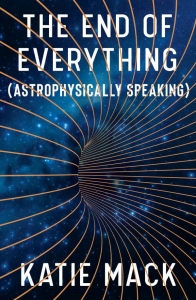“The End of Everything (Astrophysically Speaking)” with Dr Katie Mack
Throughout history philosophers, poets and explorers have been pondering upon and debating the question that what the long term future of our universe would be. The focus has been on two intriguing perspectives: would the universe continue to exist forever or would it end at some point in time in future. Modern scientists seem to be in agreement that in the distant future the world will end; our universe will die. At that time, humanity might still exist in many unrecognizable spinoff forms, venturing out to distant space, finding new homes and building new civilizations. But the death of the universe if final. It is hard to contemplate that a time will come when, all that we care about, all that we have imagined and built, that all will end. It is equally hard to address the question that how our universe will end. In her latest book “The End of Everything (Astrophysically Speaking)”, Dr Katherine (Katie) Mack outlines five different ways the universe could end, and discusses in detail the mind-blowing lessons each scenario reveals about the most important concepts in physics. In this episode of Bridging the Gaps, I speak with Dr Katie Mack about her research and about these possible endings of our universe.
Dr Katherine (Katie) Mack is a theoretical astrophysicist who studies a range of questions in cosmology, the study of the universe from beginning to end. She currently holds the position of Assistant Professor of Physics at North Carolina State University, where she is also a member of the Leadership in Public Science Cluster. Throughout her career she has studied dark matter, the early universe, galaxy formation, black holes, cosmic strings, and the ultimate fate of the cosmos. Alongside her academic research, she is an active science communicator and has been published in a number of popular publications such as Scientific American, The New York Times, Slate, Sky & Telescope, and Cosmos Magazine, where she is a columnist.
We start our conversation by discussing with Dr Katie Mack the beginning of the universe; we then discuss nature and the large scale structure of the observable universe. We discuss cutting-edge research on two important unknowns that we are faced with: Dark Matter and Dark Energy. In the book Dr Katie Mack outlines a number of ways in which this universe could end. We discuss in detail two of these possibilities. Finally we discuss the models and theories that we presently use to study the cosmos and how might a “theory of everything” enhance our ability to understand the true nature of reality. This has been a fascinating discussion with one of the most dynamic rising stars in astrophysics.


Connect With Us